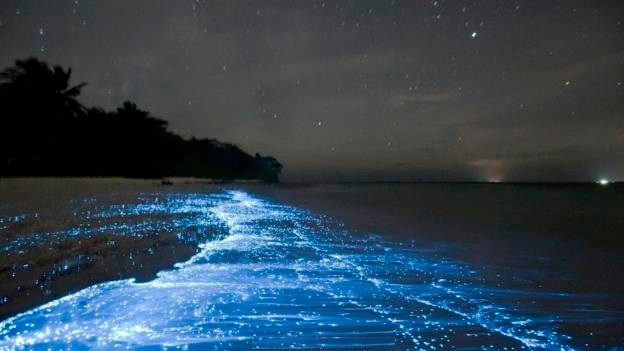The ocean is a strange place after dark
Moonlight triggers the world’s biggest orgy, strange creatures emerge from the depths, and waves glow blue. Some phenomena in the ocean can only be witnessed after dark.
Bioluminescence makes the sea shimmer. Dinoflagellates emit blue light when they’re disturbed, like at this bay on Vaadhoo Island in the Maldives (Credit: Naturepl.com/Doug Perrine)You may have seen the pictures.It’s night-time in an impossibly exotic location. Waves are breaking on the beach. The water is sparkling with electric blue lights. The internet loves an image of a magical-looking bioluminescent bay. You may also have seen travel bloggers bemoaning the real event as not quite living up the hype.Even if the latter is true, bioluminescence (in this case usually caused by planktonic organisms called dinoflagellates) is a pretty amazing natural phenomenon.Dinoflagellates emit blue light when disturbed, which is why they can be seen sparkling over wave crests, around boats or when a hand or paddle runs through them.These tiny creatures are the most common source of bioluminescence at the ocean’s surface.So-called bioluminescent bays such as in Puerto Rico and Jamaica are among the best-known places to witness the glow. However, the ephemeral phenomenon can be found throughout the ocean where there are dense gatherings of dinoflagellates.Sometimes dinoflagellates’ population increases rapidly causing blooms, which by day are coloured a less attractive red-brown, sometimes known as red tides. And some, but not all, of these red tides are poisonous.

